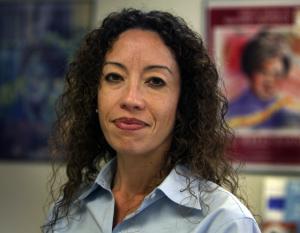Conversation With Carmen Curiel
Multicultural Center Director Engages Diverse Campus Community
 Caption: Carmen Curiel, director of Cal State Fullerton’s Multicultural Center. Photo by Karen TapiaDownload Photo
Caption: Carmen Curiel, director of Cal State Fullerton’s Multicultural Center. Photo by Karen TapiaDownload Photo
As director of the Multicultural Leadership Center, Carmen Curiel advises students in culturally based student organizations and develops campus programs that promote diversity education.
With 50 culturally based student organizations on campus, Curiel talks about her role to advise and develop students into leaders who understand and embrace diversity: “It’s my good fortune to work directly with students on projects that incorporate their cultural interests with my passion for advising, training and teaching student leaders.”
What is the center’s purpose?
The center is a learning environment that supports our culturally diverse student body by preparing students to become leaders who are self-aware, culturally competent, civically engaged and critical thinkers.
What is the center’s role on campus?
Our programs and services address issues related — but not limited to — race, ethnicity, sexual orientation, religion, gender, ability and class. Programs are broad in scope, and we are able to appeal to a wide audience that includes students and faculty and staff members. Our emphasis on multiculturalism and diversity, global consciousness and leadership distinguishes the center as a valuable asset to the campus community.
How does the center helps student clubs, such as the Pilipino American Student Association, which is hosting its Friendship Games Oct. 30?
Historically, the center has advised coordinators of the PASA Friendship Games on virtually every aspect of that event, such as reviewing university policies and procedures related to large events; risk management; budget concerns; working with campus departments; dealing with off-campus vendors; and monitoring activities on the day of the event. Students tend to underestimate the amount of work involved with such a large-scale event and often lack familiarity with university regulations. My job as adviser is to help students plan a safe and successful event.
Have culturally based clubs changed over the years?
We have seen the number of multicultural organizations increase and there is great interest among students to join culturally-based Greek fraternities and sororities. There also is much involvement with performance, arts and recreational groups that have a cultural flair, such as Ballet Folklorico, Salsa Club, Japanese Anime Club, as well as martial arts.
Why are these student clubs growing?
Our student organizations are a reflection of the student body. Because no two students are exactly alike, neither are any of our clubs and organizations. With increased diversity along demographic lines comes diversity in terms of faith, values, beliefs, ability and ideology. Student clubs contribute to the vitality of our institution, and without a live pulse running through the campus, there would be little incentive to apply one’s classroom learning towards co-curricular experiences. While there are students who attend classes and leave, there are scores more who devote time and energy to clubs and organizations, student government and campus programs.
Why is it important to develop student leaders who embrace diversity?
Because the world is bigger than Cal State Fullerton and bigger than the communities in which our students live. Often students believe they possess the experience and tools necessary to communicate effectively across groups and cultures. Misunderstandings or conflicts inevitably occur within a host of settings: the classroom, at work, in a student club or in one’s personal life. For these reasons, it’s important that we train and equip our students with the knowledge and skills that will promote greater understanding, sensitivity and improved interactions with people unlike themselves.
Oct. 19, 2010
